Mobile phone ban in school relaxed to 'ease friction'
- Published
- comments
Two schools in Wales are taking different approaches to the use of mobile phones
A ban on mobile phones in school caused "friction" and detracted from pupils' education, a head teacher has said.
Ysgol Uwchradd Caergybi in Holyhead, Anglesey, has now relaxed the ban and uses phones as a "powerful" educational tool.
Head teacher Adam Williams said he had not seen any deterioration in pupil behaviour or wellbeing.
The Welsh Government said mobile phone use was a matter for individual schools.
It comes amid concerns mobile phone use is affecting wellbeing and concentration.
Tom Crick, chairman of the group advising the Welsh Government on science and technology in the new curriculum, said an outright ban "could send the wrong message" in efforts to develop digital skills.
"It's a really contentious issue… the evidence base is not immediately clear," the professor of digital education at Swansea University said.
"The problem with doing research in these areas is... it's very hard to attribute the impact of a specific device and [show] a direct correlation with academic performance."
He added it was difficult to have a blanket approach across all schools because of different challenges and catchment areas.
What happened when this school banned phones?
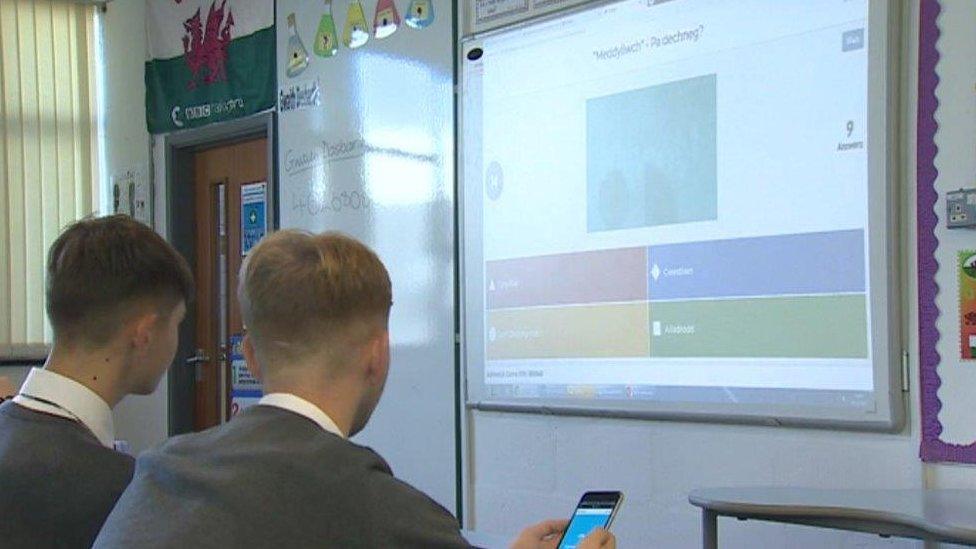
Pupils prepare to take an online quiz to help their teacher check their understanding of a lesson
When the ban was in place, pupils had to keep phones out of sight.
"We spent too much time challenging children for using phones during the day and that took time from things which were more important - the child's education," said Mr Williams.
"Also it created a negative atmosphere during the day."
After consultation, they relaxed the policy and now some teachers bring smartphones into use in the class.
"I think as a school, we've got a responsibility to teach our students how to use technology effectively... and prepare our students for the world of work."

15-year-old Harrison says he learns better through watching videos than copying things down
Pupil Harrison, 15, has found it beneficial in many ways: "We can check our progress. We can see homework that needs to be handed in and we can just do revision at break times or when we have free lessons.
"My parents think it's a good idea because they can see if I need more help at home and they can track what I'm doing."
He likes using educational videos "to learn through listening and watching things rather than copying things down" and Kahoot, an app which provides a quick way for teachers to quiz pupils to check their learning.
Mr Williams said he had not seen any negative impact on pupil wellbeing and nearly all children have a smartphone, with devices being shared to make sure no one misses out.
Why have other schools banned phones?
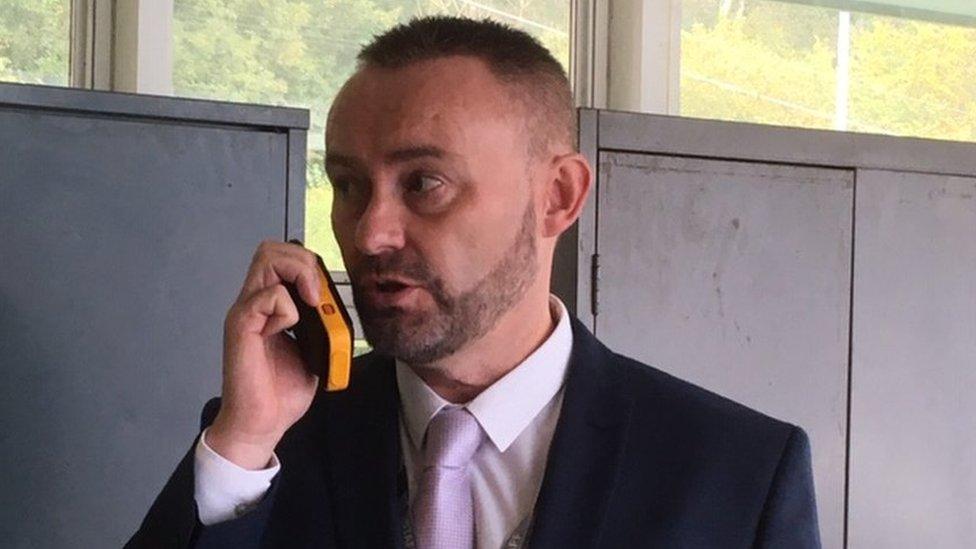
At Llangatwg Community School, head teacher Alan Rowlands uses a walkie talkie to communicate with staff after banning mobiles
Llangatwg Community School just outside Neath encourages children to use technology "where appropriate", but in September they banned phones - teachers now use walkie-talkies to communicate.
Head teacher Alan Rowlands said: "What we were finding as a school was the overreliance on mobile phones was affecting children's concentration levels, affecting their communication with each other and we really asked ourselves the serious question what is the purpose of a mobile phone in school?"
Children are allowed to have phones turned off in their bags, but they are not allowed to be seen during the school day.
"Some of us felt it would be difficult to implement, however... the children seem very much on board," Mr Rowlands said.

Head boy and head girl Benjamin and Annalise said pupils talk to each other more and listen better after the ban
Head boy and Year 11 pupil Benjamin said children were listening more, while head girl Annalise, 15, said it was "100 times better now" and no longer thinks about checking her texts or social media.
"I used to walk in the canteen, everyone was on their phones, and no one's socialising, they were used excessively… People are now interacting," she added.
Mr Rowlands found the policy change "liberating" and said while it may seem counterintuitive to remove technology from the classroom, the school had seen benefits in communication between pupils and staff.
Many schools have a policy that mobiles should be switched off during lessons, but some - such as Aberconwy School in Conwy, allow their use at break times.
Stanwell School in Penarth has a total ban on electronic devices of any sort and they cannot be brought to school unless officially authorised.
Are there rules on phone use in schools?
The Welsh Government said it did not issue guidance on the use of mobile phones, as "it is a matter for individual schools" but the effect on learning and wellbeing should be considered.
"Teachers already have the power to restrict the use of phones and we recognise that, where managed properly, phones can be used effectively in classrooms as learning tool," a spokesman said.
The UK government policy is that it is the responsibility of head teachers to determine on how phones should be used.
Last year, the then-UK culture secretary Matt Hancock said he admired schools that had enforced mobile phone bans.
What do teaching unions say?
NASUWT said schools should have clear and robust phone and social media policies.
Its official in Wales, Neil Butler, said: "Too often pupils are distracted from learning by constantly checking their phones and messaging. No pupil needs constant access to their phone during lessons."
Sarah Hannafin, senior policy adviser for the National Association for Head Teachers, said the union supported school autonomy on the issue: "Outright banning mobile phones can cause more problems than it solves, making problems less visible and obvious for schools to tackle."

What questions do you have about children and their use of technology - inside or outside the classroom? Is there anything you've always wanted to know?
Use this form to send us your questions:
If you are reading this page on the BBC News app, you will need to visit the mobile version of the BBC website to submit your question on this topic.
We may get in touch if we decide to follow up on your suggestion.
- Published20 June 2018
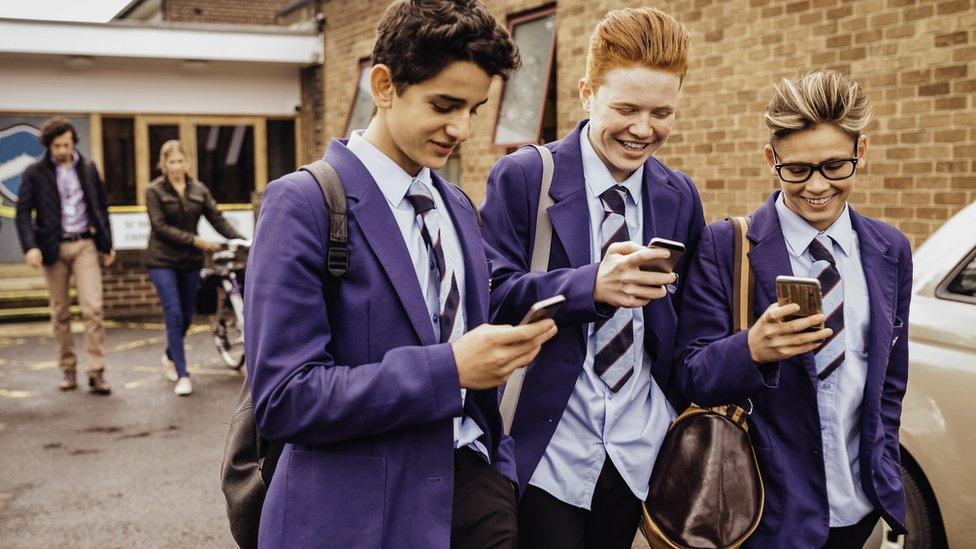
- Published21 June 2018

- Published9 June 2015
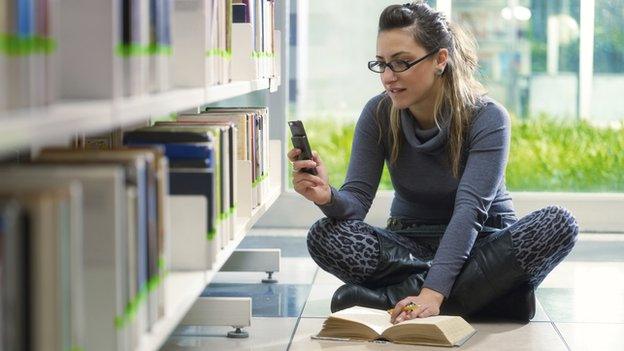
- Published7 June 2018
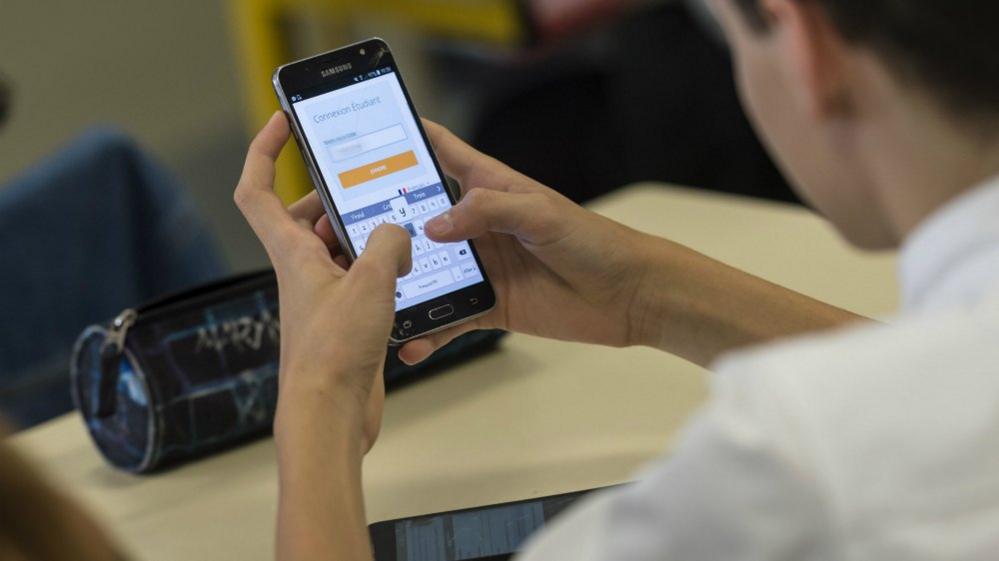
- Published7 May 2019
